Python基础教程(自学记录)
python教程/学习笔记
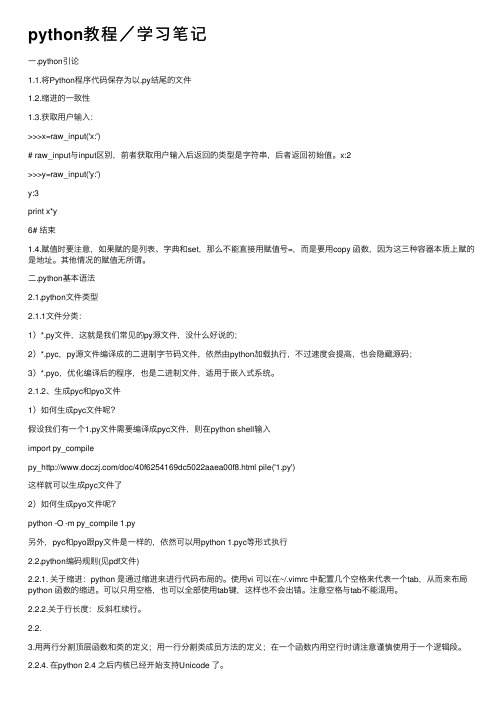
无论什么情况下,使用UTF-8 才是王道! 1 # -*- coding:utf-8 -*2 2.2.5. 导入 通常应该在单独行中使用导入。 例如:No: import sys, os Yes: import sys import os 但是这样也是可以的: from types import StringType, ListType imports 应该放在文件的顶部,仅在模块注释和文档字符串之后,在模块的全局变量和常量之前。 Imports 也是有顺序的:1)Python 标准库的import;2)第三方库的import;3)自定义的库的import; 并且在每组的import 之间使用一行空行分割。 2.2.6.以下地方不推荐出现空格: 1) 紧挨着圆括号,方括号和花括号的 如:"spam( ham[ 1 ], { eggs: 2 } )".写成"spam(ham[1], {eggs: 2})". 2) 紧贴在逗号,分号或冒号前的 如: "if x == 4 : print x , y ; x , y = y , x". 写成"if x == 4: print x, y; x, y = y, x". 3) 紧贴着函数调用的参数列表前开式括号的 如: "dict ['key'] = list [index]". 写成"dict['key'] = list[index]". 4) 紧贴在索引或切片下标开始的开式括号前 如: "dict ['key'] = list [index]".写成"dict['key'] = list[index]". 5) 在赋值(或其它)运算符周围的用于和其它并排的一个以上的空格,如: 1x=1 2y=2 3 long_variable = 3 写成 1x=1 2y=2 3 long_variable = 3 6)始终在这些二元运算符两边放置一个空格:赋值(=), 比较(==, <, >, !=, <>, <=,>=, in, not in, is, isnot), 布尔运算(and, or, not). 按 你的看法在算术运算符周围插入空格. 始终保持二元运算符两边空格的一致.一些例子: 1 i = i+1 2 submitted = submitted + 1 3 x = x*2 - 1 4 ypot2 = x*x + y*y
编程语言python入门-Python基础教程,Python入门教程(非常详细)
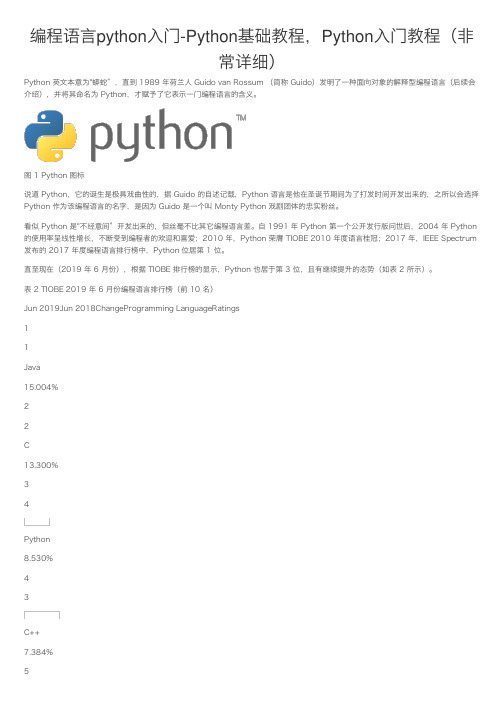
编程语⾔python⼊门-Python基础教程,Python⼊门教程(⾮常详细)Python 英⽂本意为"蟒蛇”,直到 1989 年荷兰⼈ Guido van Rossum (简称 Guido)发明了⼀种⾯向对象的解释型编程语⾔(后续会介绍),并将其命名为 Python,才赋予了它表⽰⼀门编程语⾔的含义。
图 1 Python 图标说道 Python,它的诞⽣是极具戏曲性的,据 Guido 的⾃述记载,Python 语⾔是他在圣诞节期间为了打发时间开发出来的,之所以会选择Python 作为该编程语⾔的名字,是因为 Guido 是⼀个叫 Monty Python 戏剧团体的忠实粉丝。
看似 Python 是"不经意间”开发出来的,但丝毫不⽐其它编程语⾔差。
⾃ 1991 年 Python 第⼀个公开发⾏版问世后,2004 年 Python 的使⽤率呈线性增长,不断受到编程者的欢迎和喜爱;2010 年,Python 荣膺 TIOBE 2010 年度语⾔桂冠;2017 年,IEEE Spectrum 发布的 2017 年度编程语⾔排⾏榜中,Python 位居第 1 位。
直⾄现在(2019 年 6 ⽉份),根据 TIOBE 排⾏榜的显⽰,Python 也居于第 3 位,且有继续提升的态势(如表 2 所⽰)。
表 2 TIOBE 2019 年 6 ⽉份编程语⾔排⾏榜(前 10 名)Jun 2019Jun 2018ChangeProgramming LanguageRatings11Java15.004%22C13.300%34Python8.530%43C++7.384%56Visual Basic .NET4.624%654.483%872.567%99SQL2.224%1016Assembly language1.479%Python语⾔的特点相⽐其它编程语⾔,Python 具有以下特点。
千锋教育 宋宋 python基础笔记
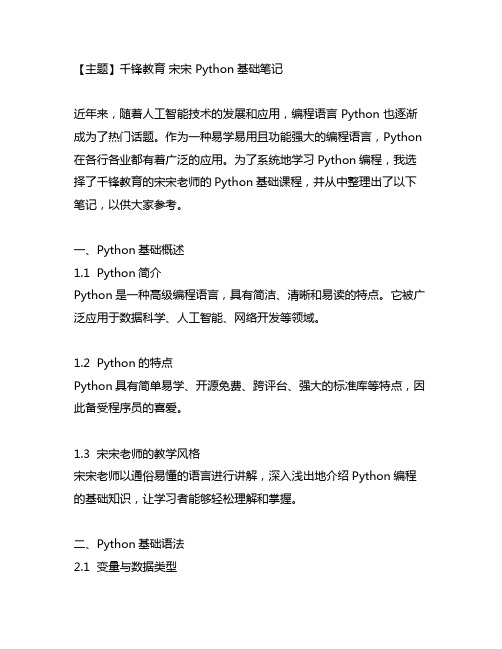
【主题】千锋教育宋宋 Python基础笔记近年来,随着人工智能技术的发展和应用,编程语言 Python 也逐渐成为了热门话题。
作为一种易学易用且功能强大的编程语言,Python 在各行各业都有着广泛的应用。
为了系统地学习Python编程,我选择了千锋教育的宋宋老师的Python基础课程,并从中整理出了以下笔记,以供大家参考。
一、Python基础概述1.1 Python简介Python是一种高级编程语言,具有简洁、清晰和易读的特点。
它被广泛应用于数据科学、人工智能、网络开发等领域。
1.2 Python的特点Python具有简单易学、开源免费、跨评台、强大的标准库等特点,因此备受程序员的喜爱。
1.3 宋宋老师的教学风格宋宋老师以通俗易懂的语言进行讲解,深入浅出地介绍Python编程的基础知识,让学习者能够轻松理解和掌握。
二、Python基础语法2.1 变量与数据类型Python中的变量不需要事先声明,直接赋值即可创建,而且可以灵活地改变数据类型。
2.2 控制流程Python中的控制流程包括顺序结构、分支结构和循环结构,通过这些结构可以灵活控制程序的执行流程。
2.3 函数与模块函数是Python中的重要概念,通过函数可以封装可重复使用的代码。
而模块则是一个包含Python定义和语句的文件,用来组织代码。
三、Python基础应用3.1 文件操作Python可以轻松地进行文件的读写操作,包括文本文件和二进制文件。
3.2 异常处理Python中的异常处理能够帮助程序更加健壮地运行,避免因错误而导致程序崩溃。
3.3 数据结构Python中有多种数据结构,如列表、元组、字典和集合,能够满足不同场景下的数据存储和处理需求。
四、个人观点与总结通过学习千锋教育宋宋老师的Python基础课程,我对Python编程语言有了更深入的了解和掌握。
宋宋老师的教学风格深受我喜爱,他的讲解通俗易懂,让我快速掌握了Python编程的基础知识。
小甲鱼《零基础入门学习Python》课堂笔记

[键入公司名称]人生苦短,我用Python [键入文档副标题]徐辉[选取日期]目录01讲:我和Python的第一次亲密接触 (12)02讲:用Python设计第一个游戏 (15)03讲:小插曲之变量和字符串 (17)04讲:改进我们的小游戏 (19)05讲:闲聊之Python的数据类型 (21)06讲:Pyhon之常用操作符 (22)07讲:了不起的分支和循环1 (23)08讲:了不起的分支和循环2 (25)09讲:了不起的分支和循环3 (27)10讲:列表,一个打了激素的数组1 (29)11讲:列表,一个打了激素的数组2 (31)12讲:列表,一个打了激素的数组3 (33)13讲:元组,戴上了枷锁的列表 (36)14讲:字符串:各种奇葩的内置方法 (38)15讲:字符串的格式语句与操作符 (43)16讲:序列相关内置函数介绍 (46)1-16讲:阶段总结 (51)17讲:函数:Python的乐高积木 (52)18讲:函数:灵活即强大 (53)18讲2:py文件打包成exe文件 (55)19讲:函数:我的地盘我做主 (56)20讲:函数:内嵌函数和闭包 (58)21讲:函数:lambda表达式 (60)22讲:函数:递归是神马 (61)23讲:递归:这帮小兔崽子 (62)24讲:递归:汉诺塔 (63)17-24讲:阶段性总结 (64)25讲:字典:当索引值不好用时 (65)26讲:字典:当索引值不好用时2 (66)27讲:集合:在我的世界里,你就是唯一 (69)28讲:文件:因为懂你,所以永恒 (70)29讲:文件:一个任务 (72)30讲:文件系统:介绍一个高大上的东西 (75)31讲:永久存储:腌制一缸美味的泡菜 (79)31讲:异常处理:你不可能总是对的 (80)33讲:异常处理:你不可能总是对的2 (82)34讲:丰富的else语句和简洁的with (85)35讲:图形界面用户入门:EasyGui (87)36讲:类和对象:给大家介绍对象 (87)37讲:类和对象:面向对象编程 (89)38讲:类和对象:继承 (90)39讲:类和对象:拾遗 (91)40讲:类和对象:一些相关的BIF (94)41讲:类和对象:构造和析构 (96)42讲:类和对象:算术运算符 (98)43讲:类和对象:算术运算符2 (100)44讲:魔法方法:简单定制 (101)45讲:魔法方法:属性访问 (103)46讲:魔法方法:描述符 (105)47讲:魔法方法:定制容器 (108)48讲:魔法方法:迭代器 (109)序----小甲鱼四件在我步入职业软件开发生涯那天起就该知道的事情我的软件开发生涯开始于大约15年以前。
python程序设计基础笔记
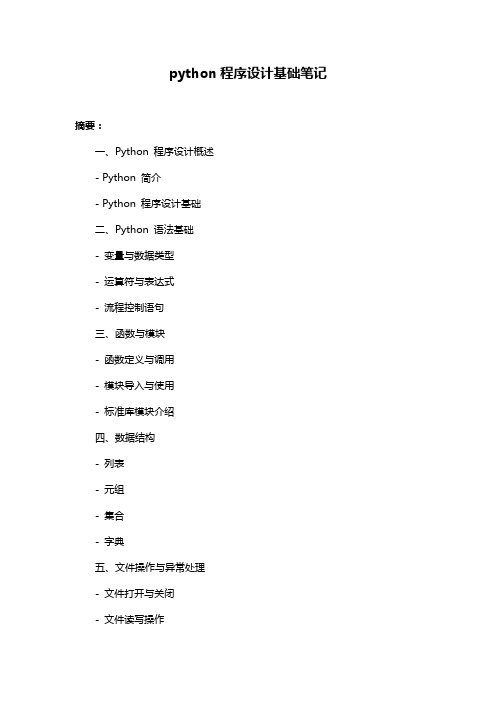
python程序设计基础笔记摘要:一、Python 程序设计概述- Python 简介- Python 程序设计基础二、Python 语法基础- 变量与数据类型- 运算符与表达式- 流程控制语句三、函数与模块- 函数定义与调用- 模块导入与使用- 标准库模块介绍四、数据结构- 列表- 元组- 集合- 字典五、文件操作与异常处理- 文件打开与关闭- 文件读写操作- 异常处理六、Python 编程实践- 实例分析- 项目实战正文:Python 程序设计基础笔记Python 是一种高级、易于学习的编程语言,以其简洁的语法和强大的功能而著称。
Python 被广泛应用于各种领域,如Web 开发、数据分析、人工智能等。
本篇笔记将概述Python 程序设计基础,并介绍Python 语法基础、函数与模块、数据结构、文件操作与异常处理等知识点。
一、Python 程序设计概述Python 由Guido van Rossum 于1989 年创立,1991 年首次发布。
Python 是一种解释型、面向对象、动态数据类型的高级程序设计语言。
Python 具有丰富的标准库,使得开发者能够轻松地完成各种任务。
Python 程序设计基础包括变量与数据类型、运算符与表达式、流程控制语句等方面。
二、Python 语法基础1.变量与数据类型变量是存储数据的容器,数据类型决定了变量可以存储的数据种类。
Python 支持多种数据类型,如整数(int)、浮点数(float)、布尔值(bool)、字符串(str)等。
2.运算符与表达式运算符用于表示运算关系,如加法(+)、减法(-)、乘法(*)、除法(/)等。
表达式是由运算符和操作数组成的,用于计算结果。
3.流程控制语句流程控制语句用于控制程序的执行流程,包括条件语句(如if-elif-else)、循环语句(如for 循环和while 循环)等。
三、函数与模块1.函数定义与调用函数是一段组织好的、可重复使用的代码,用于执行特定任务。
python 基础教程

python 基础教程Python基础教程Python是一种高级编程语言,适用于各种开发需求。
本教程旨在帮助初学者快速入门Python,并理解其基本概念和语法。
1. Python简介Python是一种高级、解释型、面向对象的编程语言。
它具有简单易学、可读性强和丰富的第三方库等特点,广泛应用于Web开发、数据分析、人工智能等领域。
2. Python安装首先,你需要下载Python的安装包并按照提示进行安装。
Python有许多不同的版本,选择适合自己的版本并下载安装。
3. 第一个程序在Python中,可以使用print()函数输出一个字符串:```pythonprint("Hello, Python!")```运行以上代码,将会在控制台输出"Hello, Python!"。
4. 变量和数据类型Python中的变量不需要指定类型,可以直接赋值。
常见的数据类型包括整数、浮点数、字符串和布尔值。
5. 运算符Python支持各种运算符,比如数学运算符(+、-、*、/等)和比较运算符(>、<、==等)。
6. 条件语句通过if-else语句可以根据条件执行不同的代码块。
例如:```pythona = 10if a > 0:print("a是正数")else:print("a是负数或零")```7. 循环语句Python提供了多种循环语句,包括for循环和while循环。
可以通过循环来重复执行一段代码。
8. 函数Python中的函数通过def关键字定义,可以有效地组织和重用代码。
示例:```pythondef add(a, b):return a + bresult = add(3, 5)print(result) # 输出8```9. 列表和元组列表和元组是Python中常用的数据结构。
列表是可变的,而元组是不可变的。
python基础笔记(非系统自用参考小甲鱼的零基础入门学习python)上
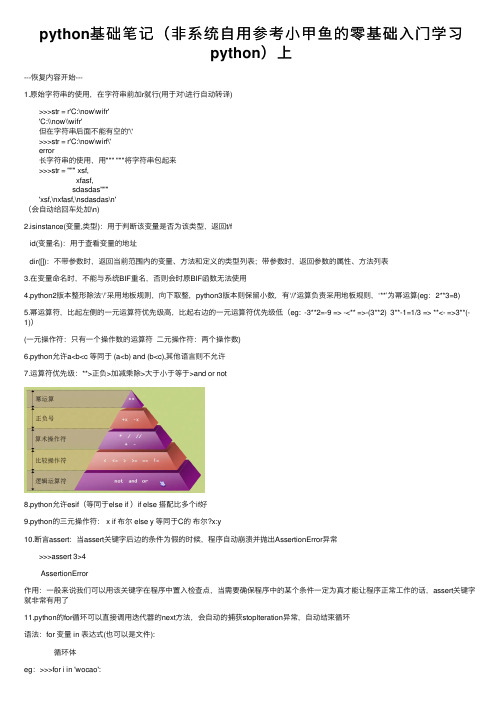
python基础笔记(⾮系统⾃⽤参考⼩甲鱼的零基础⼊门学习python)上---恢复内容开始---1.原始字符串的使⽤,在字符串前加r就⾏(⽤于对\进⾏⾃动转译) >>>str = r'C:\now\wifr' 'C:\\now\\wifr' 但在字符串后⾯不能有空的'\' >>>str = r'C:\now\wirf\' error 长字符串的使⽤,⽤""" """将字符串包起来 >>>str = """ xsf, xfasf, sdasdas""" 'xsf,\nxfasf,\nsdasdas\n'(会⾃动给回车处加\n)2.isinstance(变量,类型):⽤于判断该变量是否为该类型,返回t/fid(变量名):⽤于查看变量的地址dir([]):不带参数时,返回当前范围内的变量、⽅法和定义的类型列表;带参数时,返回参数的属性、⽅法列表3.在变量命名时,不能与系统BIF重名,否则会时原BIF函数⽆法使⽤4.python2版本整形除法‘/’采⽤地板规则,向下取整,python3版本则保留⼩数,有‘//'运算负责采⽤地板规则,‘**’为幂运算(eg:2**3=8)5.幂运算符,⽐起左侧的⼀元运算符优先级⾼,⽐起右边的⼀元运算符优先级低(eg: -3**2=-9 => -<** =>-(3**2) 3**-1=1/3 => **<- =>3**(-1))(⼀元操作符:只有⼀个操作数的运算符⼆元操作符:两个操作数)6.python允许a<b<c 等同于 (a<b) and (b<c),其他语⾔则不允许7.运算符优先级:**>正负>加减乘除>⼤于⼩于等于>and or not8.python允许esif(等同于else if )if else 搭配⽐多个if好9.python的三元操作符: x if 布尔 else y 等同于C的布尔?x:y10.断⾔assert:当assert关键字后边的条件为假的时候,程序⾃动崩溃并抛出AssertionError异常 >>>assert 3>4 AssertionError作⽤:⼀般来说我们可以⽤该关键字在程序中置⼊检查点,当需要确保程序中的某个条件⼀定为真才能让程序正常⼯作的话,assert关键字就⾮常有⽤了11.python的for循环可以直接调⽤迭代器的next⽅法,会⾃动的捕获stoplteration异常,⾃动结束循环语法:for 变量 in 表达式(也可以是⽂件): 循环体eg:>>>for i in 'wocao': print(i,end = ' ') w o c a ofor常与range(start,stop,step)搭配(start(可有可⽆,⽆则从零开始)到stop-1,step是间隔,step为2,则类似1,3,5.。
python练手经典100例-Python入门练手100例

python练⼿经典100例-Python⼊门练⼿100例【Python练习实例001】有四个数字:1、2、3、4,能组成多少个互不相同且⽆重复数字的三位数?各是多少?【Python练习实例002】企业发放的奖⾦根据利润提成。
利润(I)低于或等于10万元时,奖⾦可提10%;利润⾼于10万元,低于或等于20万元时,10万的部分按10%提成,⾼于10万元的部分,可提成7.5%;20万到40万元(含)之间时,⾼于20万元的部分,可提成5%;40万元到60万元(含)之间时⾼于40万元的部分,可提成3%;60万元到100万元(含)之间时,⾼于60万元的部分,可提成1.5%,⾼于100万元时,超过100万元的部分按1%提成,从键盘输⼊当⽉利润(I),求应发放奖⾦总数?【Python练习实例003】⼀个正整数,它加上100后是⼀个完全平⽅数,再加上168⼜是⼀个完全平⽅数,请问该数是多少?【Python练习实例004】输⼊某年某⽉某⽇,判断这⼀天是这⼀年的第⼏天?【Python练习实例005】输⼊三个整数x, y, z,请把这三个数由⼩到⼤输出。
【Python练习实例007】将⼀个列表的数据复制到另⼀个列表中。
【Python练习实例010】暂停⼀秒输出,并格式化当前时间。
【Python练习实例011】古典问题:有⼀对兔⼦,从出⽣后第3个⽉起每个⽉都⽣⼀对兔⼦,⼩兔⼦长到第三个⽉后每个⽉⼜⽣⼀对兔⼦,假如兔⼦都不死,问每个⽉的兔⼦总数为多少?【Python练习实例012】判断101-200之间有多少个素数,并输出所有素数。
【Python练习实例013】打印出所有的"⽔仙花数”,所谓"⽔仙花数”是指⼀个三位数,其各位数字⽴⽅和等于该数本⾝。
例如:153是⼀个"⽔仙花数”,因为153=1³+5³+3³。
【Python练习实例014】将⼀个正整数分解质因数。
(完整版)Python基础学习笔记
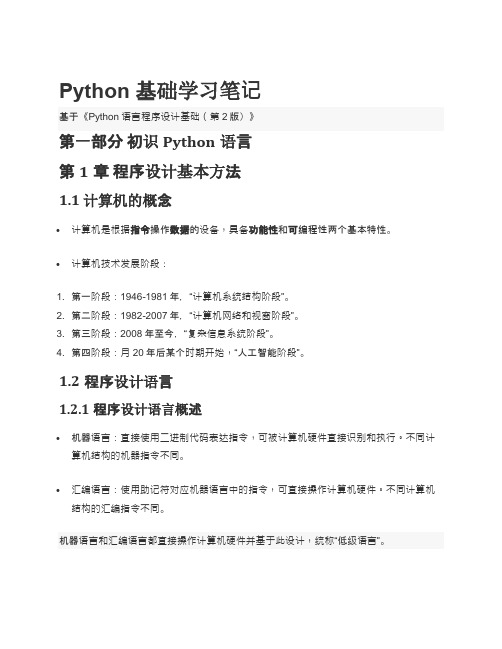
Python 基础学习笔记基于《Python语言程序设计基础(第2版)》第一部分初识Python语言第1章程序设计基本方法1.1 计算机的概念•计算机是根据指令操作数据的设备,具备功能性和可编程性两个基本特性。
•计算机技术发展阶段:1. 第一阶段:1946-1981年,“计算机系统结构阶段”。
2. 第二阶段:1982-2007年,“计算机网络和视窗阶段”。
3. 第三阶段:2008年至今,“复杂信息系统阶段”。
4. 第四阶段:月20年后某个时期开始,“人工智能阶段”。
1.2程序设计语言1.2.1程序设计语言概述•机器语言:直接使用二进制代码表达指令,可被计算机硬件直接识别和执行。
不同计算机结构的机器指令不同。
•汇编语言:使用助记符对应机器语言中的指令,可直接操作计算机硬件。
不同计算机结构的汇编指令不同。
机器语言和汇编语言都直接操作计算机硬件并基于此设计,统称“低级语言”。
•高级语言:用更接近自然语言的方式描述计算问题。
代码只与编程语言有关,与计算机结构无关。
1.2.2编译和解释高级语言按执行方式可分为采用编译执行的静态语言和采用解释执行的脚本语言。
•编译是将源代码转换成目标代码的过程。
•解释是将源代码逐条转换成目标代码同时逐条运行目标代码的过程。
1.2.3计算机编程•我学习Python的原因:1. 通过编程实现自动化,提高效率。
2. 通过编程了解一个新的广阔世界。
•学习一门编程语言(重点在于练习)1. 掌握该语言的语法2. 结合问题设计程序结构3. 掌握解决问题的能力1.3Python语言概述1.3.1 Python语言的发展Python语言是一个语法简洁、跨平台、可扩展的开源通用脚本语言。
•Python语言诞生于1990年,创世人为Guido。
•2000年10月,Python 2.0正式发布,2010年,Python 2.x系列发布最后一版(2.7)。
•2008年12月,Python 3.0正式发布,解释器内部采用完全面向对象的方式实现,代价是3.x系列版本无法向下兼容2.x系列的既有语法。
python自学手册

python自学手册摘要:1.Python 简介2.Python 的优势和应用领域3.Python 的基本语法4.Python 的数据类型5.Python 的控制流程6.Python 的函数和模块7.Python 的面向对象编程8.Python 的异常处理9.Python 的文件操作10.Python 的高级特性正文:Python 自学手册1.Python 简介Python 是一种高级编程语言,其设计目标是易于阅读和编写。
Python 具有清晰的语法和优秀的可扩展性,可以用于多种应用领域。
Python 的首个公开发布版本——Python 0.9.0,发布于1991 年。
如今,Python 已经成为了全球最受欢迎和广泛使用的编程语言之一。
2.Python 的优势和应用领域Python 的优势主要体现在简洁的语法、丰富的库和广泛的应用领域。
Python 可以应用于Web 开发、数据分析、人工智能、科学计算、自动化脚本等多个领域。
Python 的易学易用和强大的功能,使其成为了初学者和专业开发者的理想选择。
3.Python 的基本语法Python 的基本语法包括变量、数据类型、运算符、控制流程、函数、模块等。
Python 是一种动态类型的语言,这意味着在编写代码时,不需要指定变量的数据类型。
Python 可以使用等于号(=)进行赋值操作,同时支持多种数据类型,如整数、浮点数、字符串、列表、元组、字典等。
4.Python 的数据类型Python 的数据类型主要包括整数、浮点数、字符串、列表、元组、字典等。
这些数据类型都有各自的特点和用途。
例如,列表是一种有序、可变的集合,可以用来存储一系列元素;字典则是一种无序、可变的键值对集合,可以用来存储关联数据。
5.Python 的控制流程Python 的控制流程主要包括条件语句(if-elif-else)、循环语句(for 和while)、以及循环控制语句(break 和continue)。
全网最详细的Python学习笔记,值得收藏
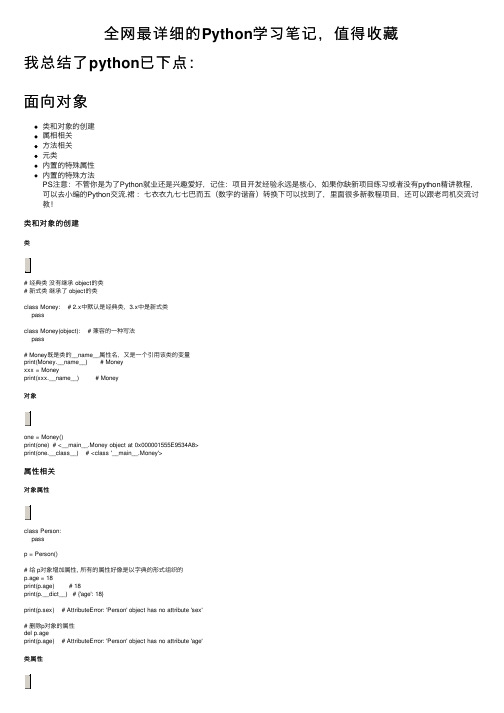
全⽹最详细的Python学习笔记,值得收藏我总结了python已下点:⾯向对象类和对象的创建属相相关⽅法相关元类内置的特殊属性内置的特殊⽅法PS注意:不管你是为了Python就业还是兴趣爱好,记住:项⽬开发经验永远是核⼼,如果你缺新项⽬练习或者没有python精讲教程,可以去⼩编的Python交流.裙:七⾐⾐九七七巴⽽五(数字的谐⾳)转换下可以找到了,⾥⾯很多新教程项⽬,还可以跟⽼司机交流讨教!类和对象的创建类# 经典类没有继承 object的类# 新式类继承了 object的类class Money: # 2.x中默认是经典类,3.x中是新式类passclass Money(object): # 兼容的⼀种写法pass# Money既是类的__name__属性名,⼜是⼀个引⽤该类的变量print(Money.__name__) # Moneyxxx = Moneyprint(xxx.__name__) # Money对象one = Money()print(one) # <__main__.Money object at 0x000001555E9534A8>print(one.__class__) # <class '__main__.Money'>属性相关对象属性class Person:passp = Person()# 给 p对象增加属性, 所有的属性好像是以字典的形式组织的p.age = 18print(p.age) # 18print(p.__dict__) # {'age': 18}print(p.sex) # AttributeError: 'Person' object has no attribute 'sex'# 删除p对象的属性del p.ageprint(p.age) # AttributeError: 'Person' object has no attribute 'age'类属性num = 666count = 1type = "rmb"print(Money.num) # 666# 对象查找属性,先到对象⾃⾝去找,若未找到,根据 __class__找到对应的类,然后去类中查找one = Money()print(one.count) # 1# 不能通过对象去修改/删除对应类的属性one.num = 555print(Money.num) # 666print(one.num) # 555# 类属性会被各个对象共享two = Money()print(one.num, two.num) # 666 666Money.num = 555print(one.num, two.num) # 555 555限制对象的属性添加# 类中的 __slots__属性定义了对象可以添加的所有属性class Person:__slots__ = ["age"] # 只允许添加⼀个 age属性p1 = Person()p1.age = 1p1.num = 2 # AttributeError: 'Person' object has no attribute 'num'私有化属性Python没有真正的私有化⽀持,只能⽤给变量添加下划线来实现伪私有;通过名字重整机制属性的访问范围:类的内部-->⼦类内部-->模块内的其他位置-->其他模块公有属性 x[x] 类的内部[x] ⼦类内部[x] 模块内的其他位置[x] ⼦类内部受保护属性 _x[x] 类的内部[x] ⼦类内部[x] 模块内的其他位置(但不推荐)[x] ⼦类内部(from ... import xxx 不可以访问,要指明all变量)私有属性 __x[x] 类的内部[ ] ⼦类内部[ ] 模块内的其他位置[ ] ⼦类内部(同_x)保护数据案例class Person:def __init__(self):self.__age = 18def set_age(self, age): # 错误数据的过滤if isinstance(age, int) and 0 < age < 150:self.__age = ageelse:print("Wrong age value")return self.__agep = Person()print(p.get_age()) # 18p.set_age(22)print(p.get_age()) # 22只读属性# 1. 属性私有化 + 属性化 get()⽅法class Person(object):def __init__(self):self.__age = 18# 可以以使⽤属性的⽅式来使⽤⽅法@propertydef age(self):return self.__agep = Person()print(p.age) # 18p.age = 666 # Attribute Error: can't set attribute# 2. 通过底层的⼀些函数class Person:# 通过属性 = 值的⽅式来给⼀个对象增加属性时,底层都会调⽤这个⽅法,构成键值对,存储在 __dict__字典中 # 可以考虑重写底层的这个函数,达到只读属性的⽬的def __setattr__(self, key, value):if key == "age" and key in __dict__:print("read only attribute")else:self.__dict__[key] = value⽅法相关⽅法的划分实例⽅法类⽅法静态⽅法class Person:def instance_fun(self): # self: 调⽤对象的本⾝,调⽤时不⽤写,解释器会传参print("instance method", self)@classmethoddef class_fun(cls): # cls: 类本⾝print("class method", cls)@staticmethoddef static_fun():print("static method")所有的⽅法都存储在类中,实例中不存储⽅法类⽅法和静态⽅法⽆法访问实例属性⽅法的私有化和变量的私有化思想差不多class Person:__age = 18def __run(self): # 只能在该类中被调⽤print("running...")创建类对象的类(类也是⼀个对象)a, s = 8, "123"print(a.__class__, s.__class__) # <class 'int'> <class 'str'>print(int.__class__, str.__class__) # <class 'type'> <class 'type'>type是元类。
python入门教程

NumPy库
VS
Pandas是Python中用于数据处理和分析的库,提供了数据结构和数据分析工具。
详细描述
Pandas提供了易于使用的数据结构和数据分析工具,如Series和DataFrame,可以方便地处理结构化数据。它提供了数据清洗、数据转换、统计分析等功能,是数据分析领域常用的库之一。
总结词
错误类型
Python中的错误类型包括语法错件
使用内置函数open()打开文件,并返回一个文件对象。
读取文件
使用文件对象的read()方法读取文件内容,支持按行读取和读取整个文件。
写入文件
使用文件对象的write()方法写入内容到文件中,支持按行写入和写入整个文件。
函数返回值
函数可以返回一个或多个值,通过return关键字返回。
函数
02
CHAPTER
Python进阶特性
面向对象编程
对象和类
Python使用对象和类来实现面向对象编程。对象是类的实例,类定义了对象的属性和方法。
封装
封装是将对象的属性和方法封装在类中,通过访问控制符(private和public)来控制对属性和方法的访问权限。
关闭文件
使用文件对象的close()方法关闭文件,确保文件资源被释放。
文件操作
03
CHAPTER
Python常用库与框架
总结词
NumPy是Python中用于处理数组和矩阵运算的库,提供了高性能的多维数组对象和函数。
详细描述
NumPy是Python科学计算的基础,提供了大量的数学函数来操作数组,可以进行数值计算、统计分析等。它支持大量的维度数组与矩阵运算,此外也针对数组运算提供大量的数学函数库。
爬虫策略与反爬虫机制
计算机软件开发编程语言Python培训教程(从零开始学编程)_课程4和5列表元祖字典字符串

4、字典
4.3 字典的遍历
字典 遍历 就是 依次 从 字典 中获取所有键值对
# for 循环内部使用的 `key 的变量` in 字典 for key in xiaoming:
print("%s: %s" % (key, xiaoming[key]))
在实际开发中,由于字典中每一个键值对保存数据的类型是不同的,所 以针对字典的循环遍历需求并不是很多
string.isupper()
如果 string 中包含至少一个区分大小写的字符,并且所有这些 (区分大 小写的) 字符都是大写,则返回 True
5、字符串
5.2 字符串的常用操作
序号 分类
关键字/函数/方法
说明
2
查找和替换 string.startswith(str)
检查字符串是否是以 str 开头,是则返回 True
从零开始学编程系列
Python 基础课程
Lecture 4、5
目录
1 2 3 4
5
模块 列表 元祖 字典
字符串
目录
1 2 3 4
5
模块 列表 元祖 字典
字符串
1、模块
1.1 模块简介
模块是 Python 程序架构的一个核心概念
模块 就好比是 工具包,要想使用这个工具包中的工具,就需要 导入 import 这个模块
模块可以让 曾经编写过的代码 方便的被 复用!
#ss_分隔线演练模块.py import ss_分隔线模块 ss_分隔线模块.py.print_lines("-", 50)
目录
1 2 3 4
5
模块 列表 元祖 字典
字符串
Python入门教程(非常详细)

使用`close()`方法关闭文件,释放资源。
文件路径处理
获取当前工作目录
使用`os.getcwd()`函数获取当前工作目录。
分割文件路径
使用`os.path.split()`函数分割文件路径,获 取目录名和文件名。
拼接文件路径
使用`os.path.join()`函数拼接文件路径。
判断文件是否存在
Homebrew安装Python。
在Linux上安装Python
03
可以使用系统的包管理器(如apt、yum)安装Python,或者
从源码编译安装。
第一个Python程序
编写第一个Python程 序非常简单,只需要 在文本编辑器中输入 以下代码并保存为.py 文件即可
```python
print("Hello,
用于绘制图表和可视化数据的库,可 以绘制线图、柱状图、散点图等多种
图表。
pandas
用于数据处理和分析的库,提供了 DataFrame等数据结构以及相应的操 作函数。
requests
用于发送HTTP请求的库,可以方便 地获取网页内容、发送POST请求等 。
THANKS
感谢观看
模块导出
在模块定义文件中,使用`__all__`列表指定需要导出的函数、类或 变量等。
模块安装与使用
将模块文件放置在合适的位置,或者使用`setup.py`文件进行安装, 然后在其他程序中导入并使用该模块。
04
面向对象编程
类与对象概念
类(Class)
类是创建对象的模板或蓝图,它定义了对象的属 性和方法。
Python入门教程(非常详细)
目录
• Python概述与安装 • 基础语法与数据类型 • 函数与模块 • 面向对象编程 • 文件操作与异常处理 • 常用库和工具介绍
Python编程入门教程

Python编程入门教程Python是一种简单易学的编程语言,广泛用于Web开发、数据分析、人工智能等领域。
对于初学者来说,Python是一个理想的入门语言。
本教程将带你从零开始学习Python编程,让你能够迅速掌握基本的编程概念和技巧。
1. 安装Python在开始学习Python之前,你需要先安装Python解释器。
各个操作系统的安装方式略有不同,你可以参考Python官方网站上的文档进行安装。
安装完成后,你可以在命令行中输入python来验证是否安装成功。
2. 编写你的第一个Python程序让我们来编写你的第一个Python程序吧!打开一个文本编辑器,输入以下代码:print("Hello, World!")保存文件时,将文件名设为hello.py,并将文件类型设置为Python源代码。
然后打开命令行,切换到文件所在的目录,输入python hello.py运行你的第一个程序。
如果一切正常,你将在命令行中看到输出结果:Hello, World!3. 变量和数据类型在Python中,你无需事先声明变量的类型,Python会自动根据赋值进行类型推导。
下面是一些常见的数据类型及其基本操作:- 整数:可以进行基本的算术运算,如加减乘除。
还可以使用**运算符进行幂运算。
- 浮点数:用于表示小数。
需要注意,由于计算机的精度限制,两个浮点数进行运算时可能产生一些不精确的结果。
- 字符串:用于表示文本。
可以使用单引号或双引号括起来。
字符串支持拼接、切片和许多其他操作。
- 列表:用于表示一组有序的元素。
列表中的元素可以是任意类型,可以动态地进行增删操作。
- 元组:与列表类似,但元组是不可变的,即无法修改其中的元素。
- 字典:用于表示键值对。
字典提供了一种通过键快速访问数据的方式。
4. 控制流程控制流程是编程中非常重要的概念,它决定了程序的执行顺序。
Python提供了多种控制流程语句,包括条件语句和循环语句。
python学习手册笔记7
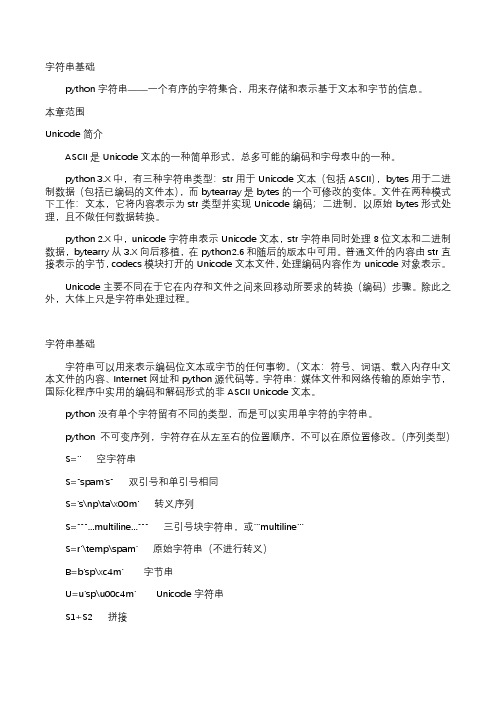
字符串基础python字符串——一个有序的字符集合,用来存储和表示基于文本和字节的信息。
本章范围Unicode简介ASCII是Unicode文本的一种简单形式,总多可能的编码和字母表中的一种。
python 3.X中,有三种字符串类型:str用于Unicode文本(包括ASCII),bytes用于二进制数据(包括已编码的文件本),而bytearray是bytes的一个可修改的变体。
文件在两种模式下工作:文本,它将内容表示为str类型并实现Unicode编码;二进制,以原始bytes形式处理,且不做任何数据转换。
python 2.X中,unicode字符串表示Unicode文本,str字符串同时处理8位文本和二进制数据,bytearry从3.X向后移植,在python2.6和随后的版本中可用。
普通文件的内容由str直接表示的字节,codecs模块打开的Unicode文本文件,处理编码内容作为unicode对象表示。
Unicode主要不同在于它在内存和文件之间来回移动所要求的转换(编码)步骤。
除此之外,大体上只是字符串处理过程。
字符串基础字符串可以用来表示编码位文本或字节的任何事物。
(文本:符号、词语、载入内存中文本文件的内容、Internet网址和python源代码等。
字符串:媒体文件和网络传输的原始字节,国际化程序中实用的编码和解码形式的非ASCII Unicode文本。
python没有单个字符留有不同的类型,而是可以实用单字符的字符串。
python不可变序列,字符存在从左至右的位置顺序,不可以在原位置修改。
(序列类型)S='' 空字符串S="spam's" 双引号和单引号相同S='s\np\ta\x00m' 转义序列S="""...multiline...""" 三引号块字符串,或'''multiline'''S=r'\temp\spam' 原始字符串(不进行转义)B=b'sp\xc4m' 字节串U=u'sp\u00c4m' Unicode字符串S1+S2 拼接S*3 重复S[i] 索引S[i:j] 分片len(S) 长度"a %s parrot" % kind 字符串格式化表达式"a {0} parrot".format(kind) 字符串格式化方法S.find('pa') 字符串方法:搜索S.rstrip() 移除右侧空白S.replace('pa', 'xx') 替换S.split(',') 用分隔符分组S.isdigit() 内容测试S.lower() 小写转换,S.upper()大写转换S.endswith('spam') 尾部测试'spam'.join(strlist) 分隔符连接S.encode('latin-1') Unicode编码S.decode('utf8') Unicode解码for x in S: print(x) 迭代'spam' in S 成员关系[c*2 for c in S] 成员关系map(ord, S) ord返回单个字符的ASCII序号re.match('sp(.*)am', line) 模式匹配:库模块字符串字面量单引号:'spa"m' 双引号:"spa'm" 三引号:'''...spam...''',"""...spam..."转移序列:"s\tp\na\0m" 原始字符串:r"C:\new\test.spm"字节字面量:b'sp\x01am' Unicode字面量:u'eggs\u0020spam'单引号和双引号字符串是一样的,单引号和双引号字符可以互换。
python入门到精通背记手册

Python入门到精通背记手册一、Python入门1. 什么是PythonPython是一种解释型的、面向对象的高级编程语言。
它具有简单易学、功能强大和可扩展性强的特点,被广泛应用于全球信息站开发、数据分析、人工智能等领域。
2. 安装Python在你开始学习Python之前,需要先安装Python解释器。
你可以到冠方全球信息站上下载最新版本的Python,并按照指引进行安装。
在安装完成后,你就可以开始编写和运行Python代码了。
3. Python基础语法Python的语法比较简单,适合初学者快速上手。
Python使用缩进来表示代码的结构,不需要使用大括号。
Python支持多种数据类型,包括整数、浮点数、字符串、列表、元组、字典等。
4. 控制流程学习Python的控制流程,包括条件语句、循环语句和函数。
掌握这些基本的控制流程,可以帮助你更好地进行程序设计和编写。
5. 函数和模块学习如何定义和调用函数,以及如何使用Python的模块。
函数和模块是Python编程中非常重要的概念,通过它们可以更好地组织和复用代码。
6. 文件操作学习如何在Python中进行文件的读写操作。
文件操作是程序与外部环境交互的重要方式,掌握好文件操作可以帮助你更好地管理数据和信息。
二、Python进阶1. 面向对象编程学习Python中面向对象编程的基本概念,包括类、对象、继承、多态等。
面向对象编程是一种重要的编程范式,可以帮助你更好地组织和管理复杂的程序。
2. 异常处理学习如何在Python中进行异常处理,处理程序在运行过程中可能出现的错误情况。
良好的异常处理可以提高程序的稳定性和可靠性。
3. 正则表达式学习如何在Python中使用正则表达式进行文本处理。
正则表达式是一种强大的文本搜索和匹配工具,能够帮助你更有效地对文本进行处理和分析。
4. 数据库操作学习如何在Python中进行数据库的连接和操作。
数据库是重要的数据存储和管理工具,通过Python可以方便地进行数据库的操作和管理。
python实训日志

python实训日志Python实训日志一、前言Python作为一种易学易用的高级编程语言,广泛应用于数据分析、机器学习、人工智能等领域。
为了提高自己的编程能力,我报名参加了一次Python实训课程。
在这次实训中,我学到了很多有关Python的知识和技巧,下面我将分享一下我在实训中的学习和体会。
二、实训内容1. Python基础知识在实训的第一部分,我们学习了Python的基础知识,包括语法、变量、数据类型、运算符等。
通过实际练习,我对Python的基本语法和常用函数有了更深入的了解。
同时,我们还学习了如何使用Python编写简单的程序,并通过实例掌握了一些常见的编程技巧。
2. Python数据处理在实训的第二部分,我们学习了Python的数据处理能力。
我们了解了Python中常用的数据处理库,如NumPy、Pandas和Matplotlib等,并学会了如何使用这些库进行数据的读取、清洗、分析和可视化。
通过实际操作,我对数据处理的流程和方法有了更加深入的认识。
3. Python爬虫在实训的第三部分,我们学习了Python的爬虫技术。
我们了解了HTTP协议和HTML语言的基本知识,并学会了使用Python的爬虫库进行网页的抓取和数据的提取。
通过实际练习,我掌握了一些常用的爬虫技巧,如模拟登录、反爬虫策略等。
4. Python机器学习在实训的第四部分,我们学习了Python的机器学习技术。
我们了解了机器学习的基本概念和常用算法,如线性回归、决策树、支持向量机等,并学会了使用Python的机器学习库进行模型的训练和评估。
通过实际操作,我对机器学习的原理和应用有了更深入的理解。
三、实训收获通过这次Python实训,我不仅掌握了Python编程的基本技能,还学会了如何利用Python进行数据处理、爬虫和机器学习。
这些技能对于我未来的学习和工作都具有重要意义。
同时,实训还培养了我的动手实践能力和问题解决能力,提高了我对编程的兴趣和热情。
python实践记录

Python实践记录一、介绍Python是一种高级编程语言,具有简洁易读的语法和强大的功能。
它广泛应用于数据分析、人工智能、网络爬虫、Web开发等领域。
本文将详细介绍Python在实践中的应用和技巧,帮助读者更好地掌握和运用这门语言。
二、Python基础知识回顾1. 变量和数据类型Python中的变量可以用于存储各种不同类型的数据,包括整数、浮点数、字符串等。
通过赋值操作,可以将值赋给变量,并在后续的代码中使用。
在Python中,不需要显式声明变量的类型,解释器会根据赋值自动推导出变量的类型。
# 示例:定义变量并赋值age = 20height = 1.75name = "John"2. 条件和循环语句条件语句和循环语句是程序中常用的控制结构。
条件语句根据条件的真假来决定执行的代码块,主要包括if语句和if-else语句。
# 示例:条件语句age = 18if age >= 18:print("成年人")else:print("未成年人")循环语句用于重复执行一段代码,主要包括while循环和for循环。
# 示例:循环语句count = 0while count < 5:print(count)count += 1# 示例:for循环names = ["Alice", "Bob", "Charlie"]for name in names:print(name)3. 函数和模块函数是一段可重用的代码块,用于封装一系列操作。
通过函数,我们可以将复杂的任务分解为更小的任务,提高代码的可读性和可维护性。
Python提供了很多内置函数,同时也可以自定义函数。
# 示例:自定义函数def add_numbers(a, b):return a + bresult = add_numbers(3, 5)print(result)模块是包含一组相关函数和数据的文件,可以通过导入模块来使用其中定义的函数和数据。
Python初学者学习笔记

代码 1 a.isdigit 2 a.isalpha 3 for I in range(a,b,c):
4d 5 and 6 or 7 print(type(a)) 8 print (a>b) 9 int() 10 str() 11 abs() 12 print(eval(‘a’)) 13 + 14 15 * 16 / 17 -= 18 += 19 *= 20 /= 21 == 22 > 23 < 24 >= 25 <= 26 a**b 27 # 28 ‘’’ ‘’’ 29 \ 30 \n 31 \t 32 ‘%a.bf’% 33 ‘%a.bd’% 34 ‘%a.s’% 35 a[b] 36 a[:b]a 37 a[:-b]a 38 while True: 39 a
13
fillcolor(‘a’)
14
begin_fill()
15
b
16
end_fill()
17
bgcolor(a)
18
textinput(a,b)
19 colormode(1/255)
1.
color(1—255,1—
20 255,1—255)
2. color(0.0—1.0,0.0—
21 1.0,0.0—1.0)
如果符合条件a,那么执行b,否则判断是否符合条件c,如果符合,那么执行d,否则执行e 四舍五入a 把a的所有首字母大写,再打出来 把a的所有字母大写,再打出来 把a的所有字母小写,再打出来 把a末尾的所有空格删除,再打出来 把a开头的所有空格删除,再打出来 把a开头和末尾的所有空格删除,再打出来
描述 前进a步 去x:a,y:b的地方 后退a步 抬笔 落笔 画b/360个半径为a个圆 将画笔调为a图案 隐藏画笔 将画笔颜色调为a颜色 左转a度 右转a度 画笔粗细切换为a
- 1、下载文档前请自行甄别文档内容的完整性,平台不提供额外的编辑、内容补充、找答案等附加服务。
- 2、"仅部分预览"的文档,不可在线预览部分如存在完整性等问题,可反馈申请退款(可完整预览的文档不适用该条件!)。
- 3、如文档侵犯您的权益,请联系客服反馈,我们会尽快为您处理(人工客服工作时间:9:00-18:30)。
Python基础教程(自学记录)第一章快速改造:基础知识1.2交互式解释器在IDLE编辑器,在提示符后输入help然后按回车;也可以按下F1获得有关IDLE的帮助信息1.4数字和表达式1/2返回0,整除除法;1.0/2返回0.5,用一个或者多个包含小数点的数字参与计算。
另外改变除法的执行方式:from_future_import division//可以实现整除,1.0//2.0返回0.0%取余数;**幂运算;>>> 1/2>>> 1.0/20.5>>> 1.0//2.00.0>>> 10%31>>> 9**(1/2)1>>> 9**(1.0/2)3.0>>> 2.75%0.50.25>>> -9%43>>> -3%21>>> -3/2-21.4.1长整数普通整数不能大于2147483647也不能小于-2147483648,若更大的数,可以使用长整数。
长整数结尾有个L,理论上小写也可以,不过为了便于识别,尽可能用大写。
1.4.2十六进制和八进制0XAF返回175 ,十六进制;010返回8,八进制>>> 0xAF175>>> 01081.5变量包含字母、数字和下划线。
首字母不能是数字开头。
1.8函数Pow计算乘方:pow(2,3),2**3均返回8;pow等标准函数称为内建函数。
Abs(-10)求绝对值,返回10;round(1.0/2.0)返回1.0,把浮点数四舍五入为最接近的整数值。
>>> pow(2,3)8>>> 2**38>>> abs(-10)10>>> round(1.0/2.0)1.0Traceback (most recent call last):File "<pyshell#43>", line 1, in <module>'Hello, '+5TypeError: cannot concatenate 'str' and 'int' objects>>>需要保证两边是一样的字符串,而有其他格式要报错的1.11.3字符串表示str和repr- 两个均为函数,事实上str是一种类型Str会将值转换为合理形式的字符串。
另外一种是通过repr函数,创建一个字符串。
Repr(x)也可以写作`x`实现(注意:`是反引号),python3.0中已经不适用反引号了>>> print 'hello,world'hello,world>>> print repr('hello,world')'hello,world'>>> print str('hello,world')hello,world>>> print 1000L1000>>> 1000L1000L>>> print repr(1000L)1000L>>> print str(1000L)1000>>> tmp=42>>> print 'The number is:'+tmpTraceback (most recent call last):File "<pyshell#55>", line 1, in <module>print 'The number is:'+tmpTypeError: cannot concatenate 'str' and 'int' objects >>> print 'The number is:'+`tmp`The number is:42>>> print 'The number is:'+str(tmp)The number is:42>>> print 'The number is:'+repr(tmp)The number is:421.11.4 input和raw_input的比较>>> name=input("What's your name:") What's your name:GumbyTraceback (most recent call last):File "<pyshell#60>", line 1, in <module>name=input("What's your name:") File "<string>", line 1, in <module> NameError: name 'Gumby' is not defined >>> name=input("What's your name:") What's your name:'Gumby'后面输入的字符串增加了引号不报错。
>>> input('Enter a number:')Enter a number:33>>> name=input("What's your name:") What's your name:'Gumby'>>> raw_input("What's your name:") What's your name:Gumby'Gumby'>>> raw_input("What's your name:")What's your name:Gumby'Gumby'>>> raw_input('Enter a number:')Enter a number:3'3'>>>1.11.5长字符串、原始字符串和unicode(1)长字符串使用三引号;转义的反斜杠用于行尾>>> print 'hello, \world!'hello, world!>>> print '''hello,world!'''hello,world!>>> 1+2+3\+410(2)原始字符串,对于反斜线并不会特殊对待,以r开头,注意字符串尾部>>> print 'c:\nowhere'c:owhere>>> print r 'c:\nowhere'SyntaxError: invalid syntax>>> print 'c:\nowhere'c:owhere>>> print r'c:\nowhere'c:\nowhere>>> print r"This is illegal\"SyntaxError: EOL while scanning string literal >>> print r"This is illegal\\"This is illegal\\>>> print r"This is illegal" "\\"This is illegal\(3)Unicode在字符串前增加前缀U>>> print u'hello, world'hello, world第二章列表和元组序列中的每个元素被分配一个序号-- 即元素的位置,也被称为索引。
第一个索引为‘0’,最后一个元素可以使用-1标记2.1序列概览Python包含6中内建的序列:列表,元组,字符串,unicode字符串,buffer对象和xrange对象。
列表和元组的主要区别:列表可以修改,元组则不能。
内建函数返回元组。
几乎所有情况下都可以使用列表代替元组。
特殊情况之一:使用元组作为字典的键,因为键不可以更改,所以不能用列表。
列表的各个元素通过逗号进行分隔,写在方括号内。
>>> edward=['Edward Gumy',42]>>> john=['John Smith',50]>>> database=[edward,john]>>> database[['Edward Gumy', 42], ['John Smith', 50]]>>>2.2通用序列操作包括:索引,分片,加,乘以及检查某个元素是否属于序列的成员,除此之外还有计算长度,找出最大元素和最小元素的内建函数。
迭代:依次对序列中的每个元素重复执行某些操作。
2.2.1索引从0开始,最后一个元素可以使用-1.索引访问的单个元素>>> greeting="Hello">>> greeting[0]'H'>>> greeting[-1]'o'>>> four=raw_input('Year:')[3]Year:2005>>> four'5'2.2.2分片冒号:第一个元素包含在分片内,第二个元素不包含在分片内,是分片之后剩余部分的第一个元素编号。
